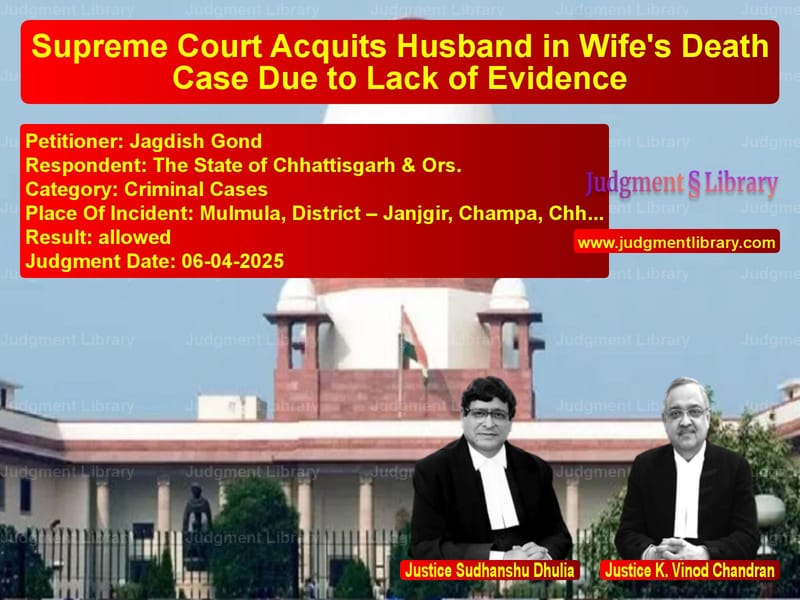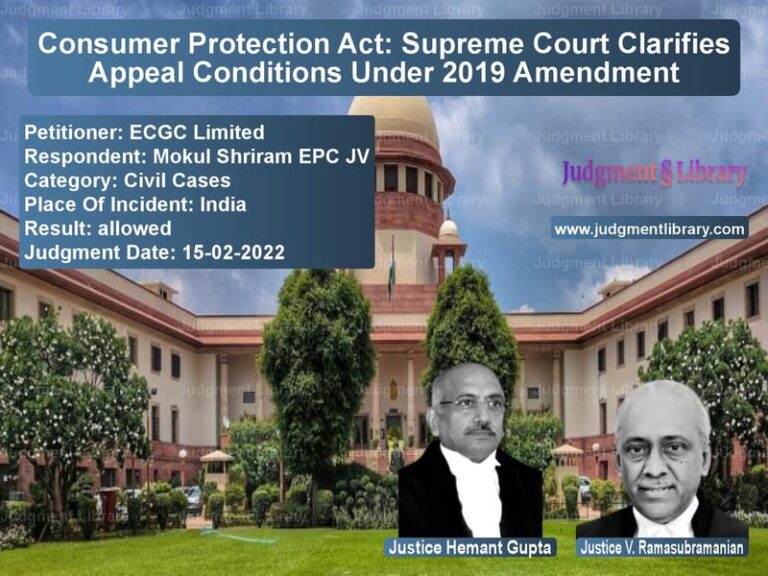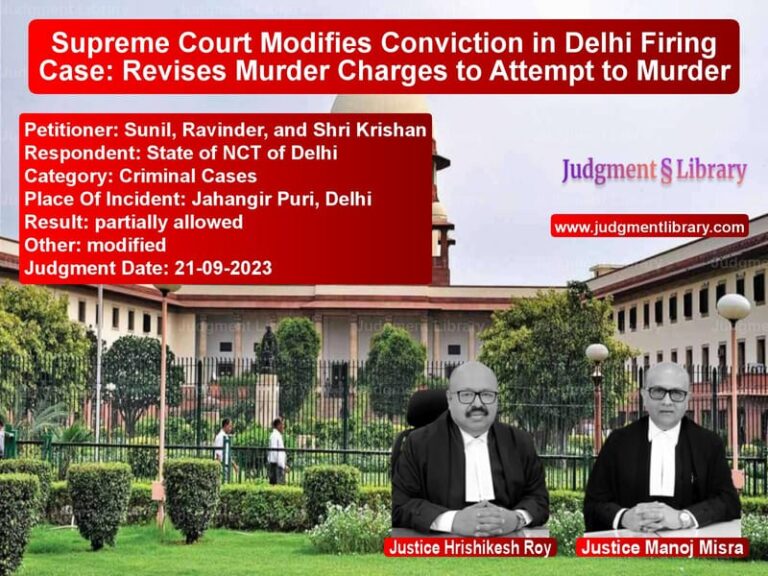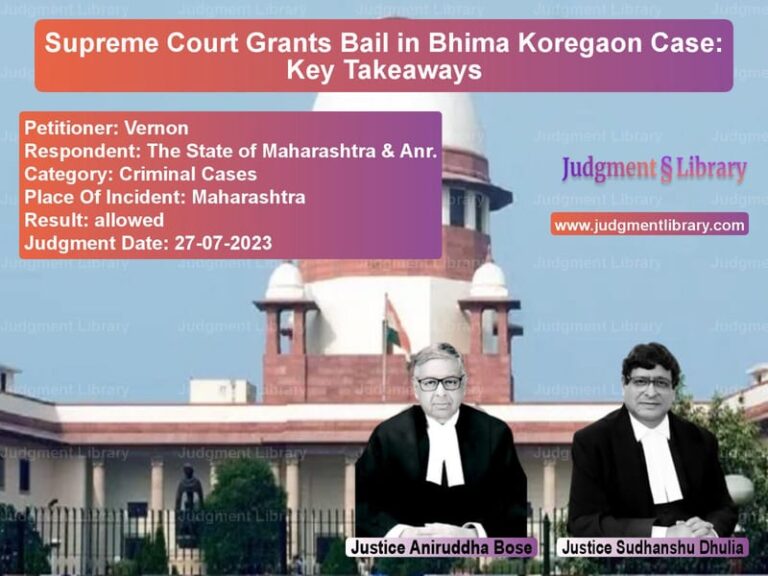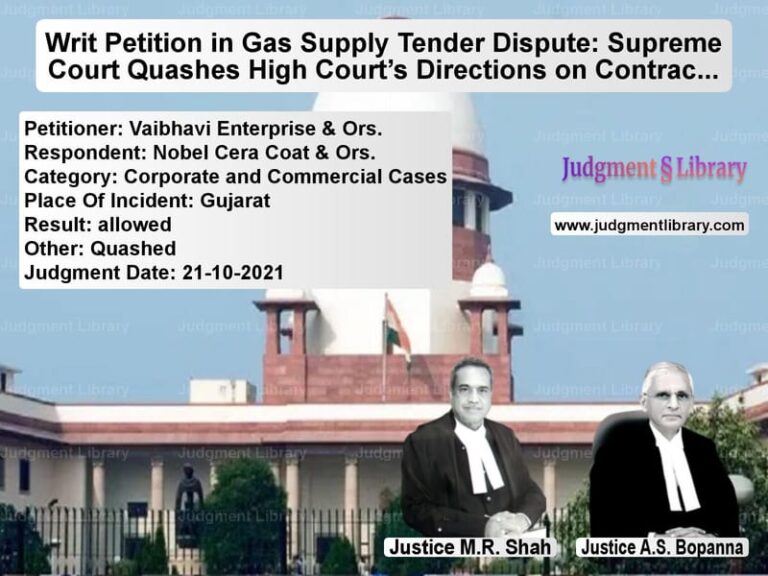Supreme Court Acquits Husband in Wife’s Death Case Due to Lack of Evidence
The Supreme Court of India recently delivered a significant judgment in the case of Jagdish Gond vs. The State of Chhattisgarh & Ors., setting aside the conviction of a husband accused of murdering his wife. The case, which revolved around the tragic death of a young woman married for just two years, highlights the importance of concrete evidence in criminal trials and the legal principles governing appeals against acquittal.
Background of the Case
The incident dates back to January 29, 2017, when the appellant, Jagdish Gond, returned home from work to find his wife lying motionless on their cot. He immediately informed his parents and the local police, who recorded the incident as a sudden and unnatural death under Section 174 of the Cr.PC. The inquest report noted a ligature mark on the front of the deceased’s neck, but no suspicion was raised initially.
Five days later, the deceased’s father lodged a complaint, leading to the registration of an FIR. Jagdish Gond, along with his parents, was charged under Sections 498A (cruelty by husband or relatives), 306 (abetment of suicide), and alternatively, Section 302 (murder) of the IPC, read with Section 34 (common intention).
Trial Court’s Acquittal
The Trial Court acquitted all three accused, concluding that the death was a suicide. The court emphasized:
“There was absolutely no circumstance pointing to the guilt of the accused.”
The Trial Court relied heavily on the medical evidence, particularly the testimony of PW-8, the doctor who conducted the postmortem. The doctor had stated that the ligature mark was only on the front of the neck, ruling out strangulation or hanging. The court also noted the absence of ante-mortem injuries and found no evidence of homicide.
High Court’s Reversal
The State appealed the acquittal, and the High Court convicted Jagdish Gond under Section 302 of the IPC, sentencing him to life imprisonment. The High Court based its decision on two key points:
- The accused and the deceased were living together, and under Section 106 of the Indian Evidence Act, the husband was obligated to explain the circumstances of his wife’s death.
- The accused’s alibi—that he was working at a cement factory on the night of the incident—was disbelieved due to lack of evidence.
The High Court held:
“The accused failed to discharge his burden under Section 106 of the Evidence Act, and his alibi was not substantiated.”
Supreme Court’s Judgment
The Supreme Court, in its judgment delivered by Justices Sudhanshu Dhulia and K. Vinod Chandran, overturned the High Court’s decision and restored the Trial Court’s acquittal. The court made several critical observations:
1. Principles Governing Appeals Against Acquittal
The Supreme Court reiterated the well-established legal principle that an acquittal should not be reversed unless there is manifest illegality or perversity in the Trial Court’s findings. The court quoted:
“Where two views are possible, the one taken by the Trial Court to acquit the accused, if found to be plausible, cannot be upset lightly by the Appellate Court.”
2. Section 106 of the Evidence Act
The court clarified the scope of Section 106, which places the burden of proving facts within the accused’s knowledge. It referred to the precedent in Trimukh Maroti Kirkan v. State of Maharashtra, stating:
“When an accused is alleged to have committed the murder of his wife, if the prosecution establishes that they were seen together or the offence takes place in the dwelling home where the husband resides, then if the accused does not offer any explanation or offers a palpably false one, it could be a strong circumstance against him. However, it cannot be the sole basis for conviction.”
The court noted that the accused had provided a plausible explanation—his absence due to work—which was mentioned in the initial police intimation. The police failed to investigate this alibi, and the High Court erred in disbelieving it without evidence.
3. Medical Evidence
The Supreme Court emphasized the lack of clarity in the medical evidence. The postmortem report (Exhibit P-11) and the doctor’s testimony (PW-8) did not conclusively establish homicide. The court quoted the doctor’s response to the police query:
“The mark found on the body of the deceased is caused by noose, and the mark of throttling has not been found. Whether the death was homicidal or suicidal is the subject of investigation.”
The court agreed with the Trial Court that the death was not proven to be a homicide.
4. Lack of Circumstantial Evidence
The Supreme Court stressed the importance of a complete chain of circumstances in cases based on circumstantial evidence, citing Sharad Birdhichand Sarda v. State of Maharashtra. It observed:
“We do not find a single circumstance pointing to the guilt of the accused, leave alone a chain of circumstances fully establishing his guilt and excluding every possible hypothesis except that of guilt.”
Conclusion
The Supreme Court allowed the appeal, setting aside the High Court’s conviction and restoring the Trial Court’s acquittal. The court directed:
“The accused shall be set free forthwith, if not wanted in any other case. The bail bonds, if any, executed by the accused shall stand discharged.”
This judgment underscores the necessity of robust evidence to sustain a conviction, especially in cases where the prosecution relies on circumstantial evidence. It also reaffirms the legal safeguards against reversing acquittals without compelling reasons.
Petitioner Name: Jagdish Gond.Respondent Name: The State of Chhattisgarh & Ors..Judgment By: Justice Sudhanshu Dhulia, Justice K. Vinod Chandran.Place Of Incident: Mulmula, District – Janjgir, Champa, Chhattisgarh.Judgment Date: 06-04-2025.Result: allowed.
Don’t miss out on the full details! Download the complete judgment in PDF format below and gain valuable insights instantly!
Download Judgment: jagdish-gond-vs-the-state-of-chhatti-supreme-court-of-india-judgment-dated-06-04-2025.pdf
Directly Download Judgment: Directly download this Judgment
See all petitions in Murder Cases
See all petitions in Suicide Cases
See all petitions in Bail and Anticipatory Bail
See all petitions in Custodial Deaths and Police Misconduct
See all petitions in Attempt to Murder Cases
See all petitions in Judgment by Sudhanshu Dhulia
See all petitions in Judgment by K. Vinod Chandran
See all petitions in allowed
See all petitions in supreme court of India judgments April 2025
See all petitions in 2025 judgments
See all posts in Criminal Cases Category
See all allowed petitions in Criminal Cases Category
See all Dismissed petitions in Criminal Cases Category
See all partially allowed petitions in Criminal Cases Category

